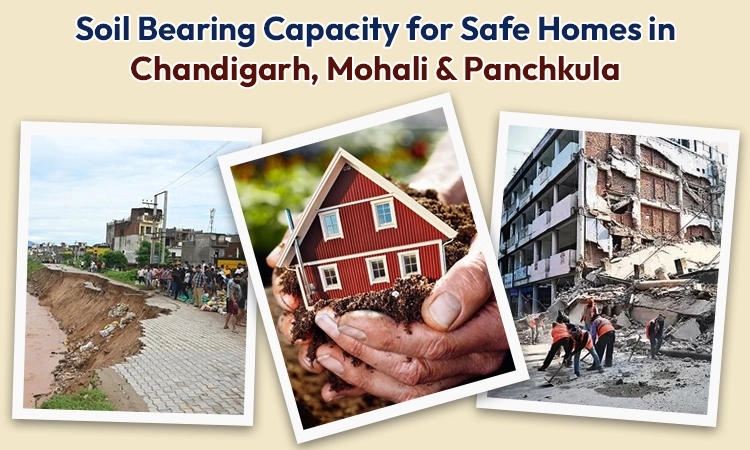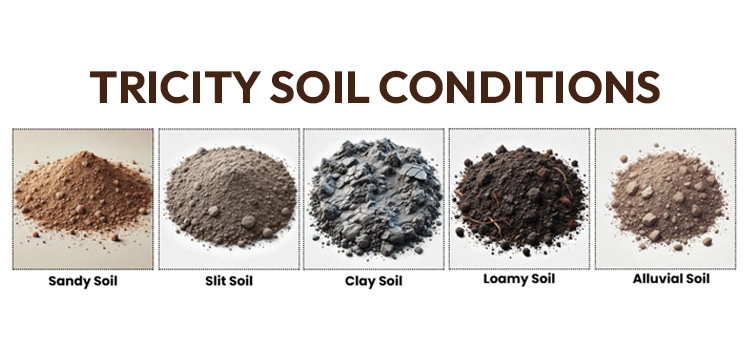
Soil Bearing Capacity for Safe Homes in Chandigarh, Mohali & Panchkula
The foundation is just as important as the actual building itself – when building your ideal home. But it happens frequently to overlook soil bearing capacity -, which refers to the ground’s capacity to support the weight of your home. Understanding the strength of your soil, whether in Chandigarh, Mohali, or Panchkula, can make the difference between costly repairs and decades of structural stability.
Professional soil testing is crucial to determining the strength of the ground before the first brick is laid. This important stage aids engineers and builders in creating long-lasting foundations – that ensure long-term home safety.
What Is Soil Bearing Capacity?
The maximum load that the ground beneath your foundation can bear without settling or failing is known as the soil carrying capacity. Each soil type – rock, silt, sand, or clay – has different weight-bearing limits:
- Clay soils expand and contract with moisture – which can cause foundation movement.
- Sandy soils may shift – when subjected to heavy loads, although they drain well.
- Although they are quite strong – rocky soils require specially designed excavation equipment.
Because of the varied terrain in the Tricity region, soil stability can change dramatically over short distances, therefore testing is crucial before construction begins.
Why Soil Testing Matters Before Construction
Comprehensive soil testing – is the first step toward building a strong, lasting home. Engineers analyze soil type, composition, and load capacity to guide foundation design decisions.
Key benefits of soil testing:
- Accurate foundation depth and type selection.
- Assessment of drainage capacity and moisture levels.
- Enhanced safety against load-induced movement or weather variations.
For example, in Mohali and Panchkula, sandy and loamy soils might require reinforced foundations to handle seasonal changes.
Foundation Strength – The Anchor of Your Home
Your foundation is the solid base that transfers the building’s load to the earth. Common foundation types include:
- Shallow foundations: Best for strong soil near the surface.
- Deep foundations: Used when transferring loads to deeper, more stable layers.
- Raft/Mat foundations: Ideal for uneven soil distribution.
The combination of precise soil assessment and tailored foundation design helps avoid common structural issues such as sinking, tilting, and wall cracks.

Tricity Soil Conditions – What You Should Know
- Chandigarh: Predominantly sandy loam with good drainage, suitable for most residential builds.
- Mohali: Clay-heavy areas need deep foundations and effective drainage systems.
- Panchkula: Mixed soils due to Shivalik Hills proximity—ranging from coarse sand and gravel to loose alluvium – that requires stabilization.
These variations emphasise the need for local soil expertise – before construction.
Steps to Ensure Foundation Safety
Professional builders and engineers follow a tested process to guarantee foundation reliability:
- Site investigation: Field sampling and lab analysis
- Load calculations: Determining maximum safe weight.
- Foundation type selection: Based on soil tests and structural design.
- Quality control: Ensuring steel, concrete, and other materials meet safety standards.
Following these steps ensures long-lasting structural safety and peace of mind.
Local Expertise for Safe Home Construction
Customized foundation solutions are necessary in Chandigarh, Mohali, and Panchkula due to variations in soil composition and moisture. Expert builders deliver stable, sustainable homes by combining local expertise with modern techniques.
A reliable construction partner will also focus on:
- Proper site drainage.
- Reinforced concrete foundations.
- Anti-damp treatments to prevent moisture damage.
- Eco-friendly building materials for sustainable living.
Key Takeaway
The strength of a home begins with its foundation, which depends on the soil beneath. You don’t want to take the chance of skipping soil testing. Whether you’re building in the sandy loam of Chandigarh, the clay-rich ground of Mohali, or the mixed terrain of Panchkula, partnering with experienced professionals ensures structural safety, durability, and comfort for years to come.

 Get an expert-reviewed estimate tailored to your project, location, and budget. Share your details for an accurate construction or renovation cost.
Get an expert-reviewed estimate tailored to your project, location, and budget. Share your details for an accurate construction or renovation cost.